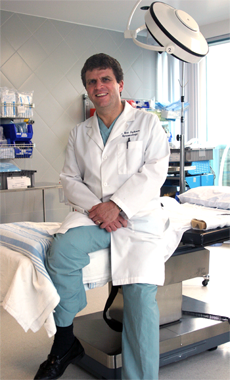
“Designer vaginal surgery is on the cutting edge in terms of cosmetic surgery trends, no pun intended,” says Dr. Roy Jackson, a Vancouver obstetrician and gynaecologist who specializes in vaginal and vulvar cosmetic augmentation procedures. Jackson is taking a lunch-break with me before his afternoon appointment at the False Creek Surgical Centre: a combined tummy tuck and “laser vaginal rejuvenation.”
According to The American Society of Plastic Surgeons, these surgeries have become the hottest trend in the field, thanks largely to Dr. David Matlock of the LA-based Laser Vaginal Rejuvenation Institute. He taught Jackson his techniques five years ago and is booked solid for the next six months “making things pretty.”
According to Matlock, the most popular surgeries are “liposculpting a mons pubis which is too fat,” laser-cutting “sagging or long labia majora,” injecting fat into the labia, tightening the vaginal passage to enhance a woman’s “sexual gratification” and even re-constructing hymens. It might sound like some kind of horror plot, but according to Matlock, “this is a no-brainer for women” who “want an overhaul.”
Porn ideals
For Matlock, it all started when a woman he treated for incontinence commented to him that after her surgery, her sex life was improved, so much so that her husband said it was “like being with a new woman.” Through word of mouth and an ad in a local paper in 1998, he became “inundated with calls” from women who didn’t have incontinence but wanted tighter vaginal passages.
Other women came in with porn mags, saying they wanted to look like the women in the pictures, and he developed other labial and pubic procedures to meet their needs.
Now, a whole spectrum of women from their teens to their 60s is opting for these surgeries: from waitresses to lawyers to stay-at-home-mothers. Jackson recently operated on a “high-profile supermodel” and Matlock recalls “a young nude dancer,” with “a beautiful genital structure, but excess skin like a raspberry.” So, he performed a labioplasty to “make the labia majora hug the labia minora, like a pencil.”
Sarah, a single 22-year-old Toronto university student and waitress, travelled to LA last year for her surgery with another designer vagina specialist, the appropriately named Dr. Gary Alter. Sarah had a labia reduction. “I felt uncomfortable with the way my vagina looked. I'd say I started noticing a difference between me and other girls and become more aware and embarrassed when I was, like, 13. It brought down my confidence and later made me not want any guy to see me naked.” Sarah is “totally satisfied with the results.”
‘Totally natural’
“You have to be realistic, right?” Sarah says. “He's not going to give you a totally different vagina, just take the extra skin off yours. There are actually barely any scars. It looks totally natural, and there is absolutely no loss of feeling. Now I don't have to hide anything. I rarely had sexual relationships before but now, it's a lot more fun! I feel totally free.”
Women often say they feel free, liberated, somehow more like their true selves after cosmetic surgery. These ideas surfaced when Kathy Davis wrote about cosmetic surgery recipients in the mid-90s and claimed that these women were empowered “cultural agents” of feminism, pursuing personal goals and re-claiming their bodies. Since then, cosmetic surgery numbers have been steadily increasing, with a new surgery targeting a different body part appearing virtually every year.
Feminists and bio-ethicists, however, wonder if recipients are more like “cultural dopes” and merely puppets of cultural forces fixated on physical perfection.
“We wanted to look at the reasoning involved with the ‘feminist agency’ idea that cosmetic surgery improves women’s circumstances,” says University of Washington philosophy professor Sara Goering, who has been studying recent cosmetic surgery recipients. She’s found that most of the women she’s polled feel “less autonomous and feel pressure to conform to social biases.” She’s also found that “all of the women had lower self-esteem” after surgery and in fact wanted more surgeries.
Feminist procedures?
“Even good feminists don’t want to undercut women’s choices, but I think we need to look at the larger moral implications,” says Goering. “The easier it becomes to do, the more the responsibility to look like this shifts and places a burden on the person who chooses not to augment.”
Back at the lunch table, Dr. Jackson thinks “women should be entitled to have their choice. I might see a patient who’s going to have a hysterectomy, right. I’ll be thinking to myself, geez, this is unbelievable what I’m seeing here. And she is not even aware of the fact that her labia are a problem for her. Then I’ll see a woman’s labia, which compared to other women might be reasonable, but to her it’s a huge thing. She’s doing this for herself, for her self-confidence. So I just ask what I can do to help.”
What about those social implications and the heavy stress on superficial aspects of self-esteem? “
Okay,” says Jackson, “Let’s assume that on a psychological level, a woman sees herself as 80 percent perfect, and feels some of her shortcomings are based on her physical appearance. We could build her confidence to 90% by taking care of the physical aspects and then maybe by working with her psychologically you can build her to 100 percent, or 98 percent. I spend a lot of time building up their psyches. I’m a very positive person and I want to ooze – you know, I want them to be passionate and appreciative of life and feel positive that the glass is half full, not half empty.”
Where are the men?
Jackson admits he can’t fix everyone and does turn away the odd patient. “The red flags are, first if you don’t quite develop that patient-doctor rapport,” says Jackson. “Or if I think the reason she wants to have surgery is the wrong reason: for example, a woman who has never had any children, and who wants a rejuvenation done because she thinks her vagina isn’t tight enough, and she’s hoping to have this unbelievable sexual experience – one I won’t be able to provide. I would tell her from the outset, your ability to have an orgasm has nothing to do with the surgery.”
Jackson recently refused a patient. “She wouldn’t leave me alone, phoning me every day: ‘why won’t you operate on me?!’” Dr. Matlock even had a patient threaten to “go outside with a razor blade and cut it off.” He had to call in security.
“Are we so programmatically masochistic that we not only accept but lust after these incredibly dangerous procedures?” wonders Virginia Blum, a University of Kentucky English professor, social theorist, and writer of the book Flesh Wounds: The Culture of Cosmetic Surgery. “Why not do these surgeries if they make you feel better? Because it participates in making people crazy. Cosmetic surgery is an incredibly addictive structure.”
Blum has watched a few “brutal” cosmetic surgeries operations, including marathon all-day multiple procedures, and found it “really scary seeing these women treated like cars at the auto shop.” Cars are an appropriate analogy of the way we are increasingly objectifying ourselves to become marketable, palatable, shinier. “Cosmetic surgery is now a mainstream structure which proliferates the idea of consumption as empowerment and objectifying yourself as the best, quickest route to happiness,” says Blum. “But, why are so few men joining in?”
Indeed, while there was a 44 percent increase in US cosmetic procedures in 2004, including a 17 percent increase in surgeries, the surgery rates decreased 11 percent for men. Plus, most cosmetic surgeons are men. “They’re the darlings of the media,” says Blum, “And they’re getting more and more intrepid, walking an increasingly sharp ethical edge.”
A better product
While other surgeons invent new procedures, like Dr. Alter’s “pie-wedge” labioplasty, Jackson wants to add more psychology to his practice. “One of my mentors is Dennis Waitley. I just finished studying his work on the psychology of winning. Life is a game and we can win this game. In order to play the game right, you’ve gotta believe in yourself. If that means doing some surgery to contribute to building your belief in yourself, do it. If you don’t need it, don’t do it.”
“It’s part of the environment of taking the bar of civilization to the next level,” says Jackson. “We are producing some great people in the world today. At the end of the day, the human being should be a better product.
“I think life is fantastic. If my patient tells me that in the morning she just can’t wait to get out of bed, this is a happy person. If she tells me she loves Mondays, that’s a second indication. I’m totally against the phrase TGIF. Ah Monday, I love Monday. I try to instil in my children [aged 9 and 12] and the people I interact with that the next time someone says to you TGIF, say, you should rename it TGIM. Thank God it’s Monday. The week starts with opportunity. I hate Fridays. You know why I hate Fridays? Because it’s a weekend. I don’t like weekends.”
Others might welcome a chance to sail or hit Whistler’s slopes. “I’m a contrarian,” says the doctor. “I’m being a bit bizarre here but I’m giving you an example of what I really believe. If we enhance their happiness with the way they look, let’s do this. My goal is to at least get a smile out of them. We have a competition in our office. If I can get them to leave the office smiling or chuckling, I get a point. If they don’t leave with a smile, I lose a point. At the end of the day, we check the score and I win.”
Scoring against other doctors at the office? “No, myself. If I can make people feel better about themselves, then I’m winning. That’s what life is about. I want to win. I want people to feel good."
Danielle Egan is a freelance writer who has written for Vancouver magazine, Jane, Maisonneuve, Taddle Creek, Fashion, Salon and Seed. She lives in Vancouver. ![]()















Tyee Commenting Guidelines
Comments that violate guidelines risk being deleted, and violations may result in a temporary or permanent user ban. Maintain the spirit of good conversation to stay in the discussion.
*Please note The Tyee is not a forum for spreading misinformation about COVID-19, denying its existence or minimizing its risk to public health.
Do:
Do not: